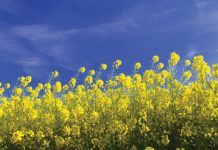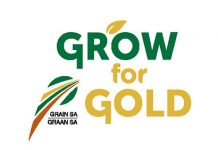January 2018
JANE MCPHERSON, manager: Farmer Development, Grain SA
Grain SA has been involved in farmer development since its inception in 1999 and the relevance of this programme has increased over the years.
Because of the political and historical past, commercial agriculture rested in the hands of whites. Since 1994 with the dawn of true democracy in South Africa, there has been a lot of land restitution and redistribution, while at the same time farmers in the old ‘homeland’ areas have access to very large tracts of land which is not being used optimally (for various reasons that will be discussed later in this article). This has contributed to the increased need for farmer development.
Background
Farmers use land to produce food and fibre and through this secure household and national food security. As a developing country, South Africa needs a vibrant rural economy. People are moving to the cities in vast numbers with the hope of a ‘better life’.
Regrettably, many are disappointed by the fact that the cities cannot really accommodate them adequately and there are only few employment opportunities there. By assisting farmers to use the land they have available (however small), the sector will be able to ignite the rural economy and set the base for other developments. The agricultural sector needs to be transformed so that it can have a united voice representing the sector and addressing the common needs and challenges. As a country, South Africa needs food sovereignty – it cannot afford to be reliant on imports of basic foods.
The unemployment rates in the country are very high and although the grain sector is not very labour intensive, there are many employment opportunities, which are created in the rural areas because of primary agricultural activities.
Existing programme
Over the past number of years, Grain SA has been very fortunate to receive funding from the Maize Trust, Winter Cereal Trust, Oil and Protein Seeds Development Trust, the Sorghum Trust, the AgriSETA, the ARC, the national Departments of Agriculture, Forestry and Fisheries and the Department of Rural Development and Agrarian Reform (for the recapitalisation of farmers) and the various provincial departments that deal with agriculture.
In an attempt to service all developing farmers in the grain, oil and protein seeds and cereal producing areas, offices have been established in Lichtenburg in the North West, Ladybrand in the Free State, Nelspruit in Mpumalanga, Louwsburg and Dundee in KwaZulu-Natal which also services parts of Mpumalanga, Kokstad, Maclear and Mthatha in the Eastern Cape, and Paarl in the Western Cape (nine offices in total as well as Bloemfontein from whence this programme is managed). These offices are strategically placed to service a wide area where grains can be produced profitably and where developing farmers have access to land.
New partners in the programme
Since the inception of the programme, we have relied on the generous support of the grain trusts for the major funding of the programme. However, since the 2016/2017 financial year, we were very fortunate to have had new partners assist with the funding for the programme. We were very blessed to have Monsanto contribute very generously to the programme, as well as Afgri, DuPont Pioneer, Sasol Base Chemicals and Pannar.
Without these new partnerships, we would have had to scale down on the programme and lose some of the momentum that has been gained from the efforts made over the preceding years. It has been most heartening to realise that input suppliers realise the importance of farmer development and are willing to invest in these farmers for the future of this country.
Focus of the programme
The mission of the programme is ‘To develop capacitated sustainable grain farmers, and to contribute to household and national food security through the optimal use of the land available to each farmer’.
Farmers in this programme fall under all forms of land tenure – communal land that is managed by the tribal authority while owned by the government, commonage land that is owned and managed by the local municipalities, restitution farmers, farmers who have been the recipients of land redistribution, own private land, as well as leased private land.
The land redistribution programme includes the Settlement Land Acquisition Grant (SLAG) which was granted to groups of families on land, the Land Redistribution for Agricultural Development (LRAD) grant, and the Proactive Land Acquisition Scheme (PLAS). The first two programmes transferred the ownership of the land to the beneficiaries while in the last scheme, the land is owned by the state and leased to the beneficiaries.
The study of human development has become a focus area over past decades and through various interventions in many countries, it has become evident that the most important factor that leads to sustainable development is the development of the capacities of the individual who has to take responsibility for his/her own destiny.
Over the years attempts have been made to encourage development through the investment in infrastructure, production inputs, mechanisation and machines, and giving grants and it has been realised over the years that the single most important factor in successful growth, development and transformation is the human element.
It is a result of all these studies that the programme believes that:
- Farmers should be empowered to farm for themselves (not farmed for by contractors).
- Where at all possible, farmers should own their own equipment and not rely on the activities of other service providers.
- Farmers with any size of farm can be assisted to use the land that is available to them using the most modern methods of crop production.
- The measure of success is the sustainable optimal production of profitable crops on every hectare (and not the total number of hectares planted, or the total number of tons harvested).
Strategy of the development programme
- Sustainable land use
- Optimal use of currently unproductive land
- Increased financial returns to farmers on the land they have available, through:
- Increased yields
- Reduced production costs
- Improved tillage practices
- Commercial marketing of the crops
- Use of modern technology
- Crop rotations
- Financial independence of the farmer
- Improved own mechanisation for farmers at all levels (reduced reliance on contracting)
- Improved knowledge and skills relating to production practices, land use, mechanisation, management, marketing, business acumen and total resource utilisation
- Sector transformation (more black farmers in the agricultural sector, and improved representation of black farmers on industry bodies)
- Improved access to production credit for black farmers
- Affordable and accessible multi risk insurance for farmers
- Individual empowerment of each farmer (individual accountability and responsibility)
- Improved image of agriculture (particularly with the youth)
Thanks and appreciation
As Grain SA, we express our sincere thanks to all the partners who have made this programme possible. Their commitment to invest in the developing sector is a testimony to their intention to help to transform the sector so that our country can remain food secure for generations to come. If the world should to be able to feed the global population, every possible piece of arable land needs to be put to optimal use. Growing farmers is a slow process and we appreciate the understanding and commitment displayed by our partners, both old and new. Thank you!
Publication: January 2018
Section: Grain SA

















